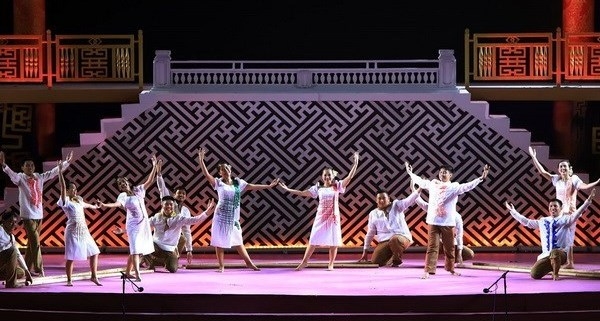
Foreign artists devoted their unique performances to entertain audiences at An Dinh Palace on April 30 as part of the ongoing Hue Festival 2018 in the central province of Thua Thien-Hue.

An art performance
at Hue Festival
(Photo: VNA)
Thousands of rock fans had a frenetic night with songs in the
debut album of France’s
rock band Lysistrata.
Meanwhile, Mongolian artists brought
their epics (Mongolian tuuli) – UNESCO-regconised Intangible Cultural Heritage
- traditional dances and music to the festival.
The Moroccan music troupe Majid Bekkas
entertained the audiences with its impressive performances which show a new
form of musical expression taking root from the spiritual music of Gnawa
trance, mixed with African jazz and blues.
Themed "Cultural Heritage with
Integration and Development: Hue
- One Destination, Five World Heritage”, the Hue Festival 2018, the 10th of its
kind, are taking place from April 27 to May 2.
According to the organising board,
during the first part of the festival from April 27-29, nearly 30 art
performance programmes and festivals were organised, attracting nearly 50,000
visitors to Thua Thien-Hue province per day.
Not only in Hue city, this year’s festival is also being
held in villages. Visitors are offered a chance to participate in a festival in
Phuoc Tich ancient village in Phong Dien district or join a market day in Thuy
Thanh commune, Huong Thuy town where they can enjoy the locality’s specialties.
Source: NDO
With an increasingly vibrant and widespread emulation movement aimed at building cultured residential areas and cultured families, Yen Thuy District has been making steady progress toward improving both the material and spiritual well-being of its people, while fostering a civilized, prosperous, beautiful, and progressive community.
Once lacking recreational spaces and community facilities, Residential Group 2 in Quynh Lam Ward (Hoa Binh City) has recently received attention for the construction of a new, spacious, and fully equipped cultural house. The project followed the model of state support combined with public contributions in both labor and funding.
The "All people unite to build cultural life" movement, which has been effectively integrated with Kim Boi district’s socio-economic development goals, is fostering a lively spirit of emulation across local residential areas, hamlets, villages, public agencies, and enterprises. In addition, through the initiative, traditional cultural values are being preserved and promoted, while community solidarity and mutual support in poverty reduction and economic development are being strengthened.
A working delegation of the Hoa Binh provincial People’s Committee led by its Permanent Vice Chairman Nguyen Van Toan on June 11 inspected the progress of a project to build the Mo Muong Cultural Heritage Conservation Space linked to tourism services in Hop Phong commune, Cao Phong district.
Born and growing in the heroic land of Muong Dong, Dinh Thi Kieu Dung, a resident in Bo town of Kim Boi district, in her childhood was nurtured by the sweet lullabies of her grandmother and mother. These melodies deeply imprinted on her soul, becoming an inseparable part of her love for her ethnic group's culture. For over 20 years, this love for her hometown has driven Dung to research, collect, and pass down the cultural values of the Muong people to future generations.
In the final days of May, the Ethnic Art Troupe of Hoa Binh Province organized performances to serve the people in remote, mountainous, and particularly disadvantaged areas within the province. These were not just ordinary artistic shows, but they were the meaningful journeys aimed at spreading cultural values, enhancing the spiritual life of the people and contributing to the preservation of ethnic minority cultural identities.



